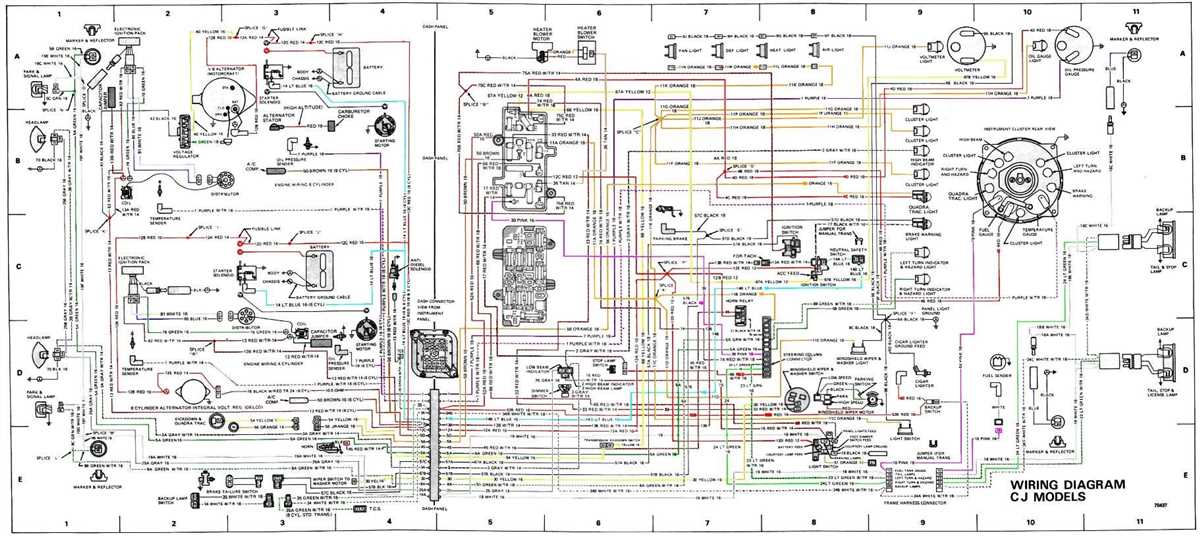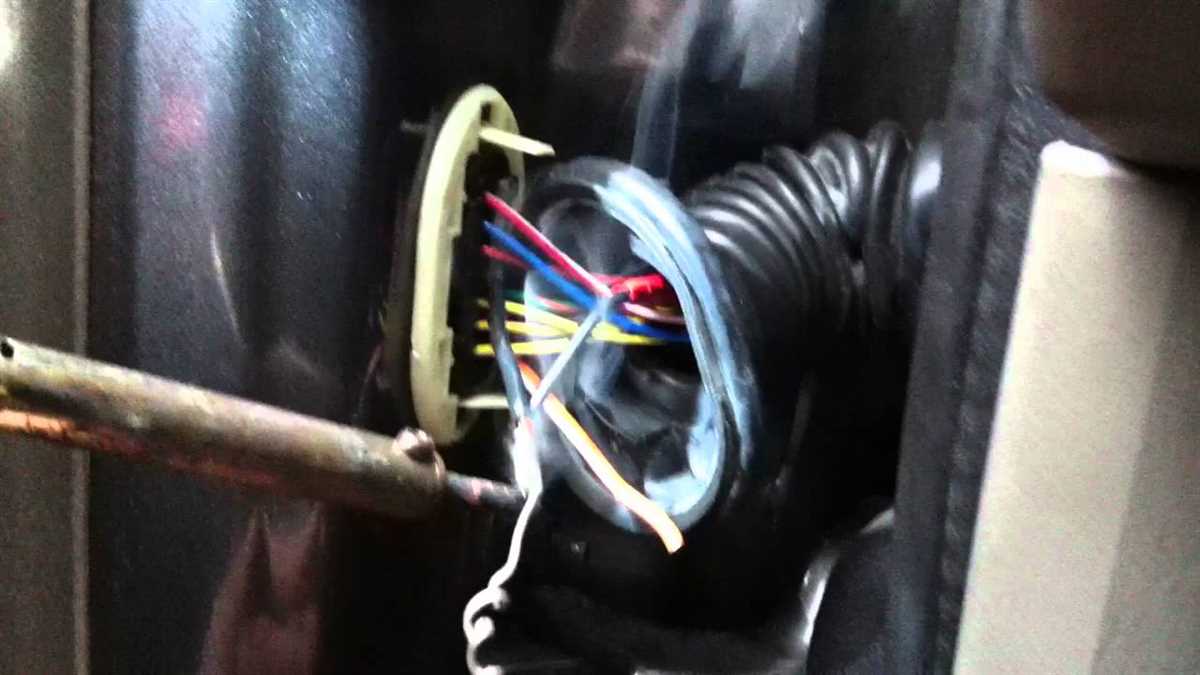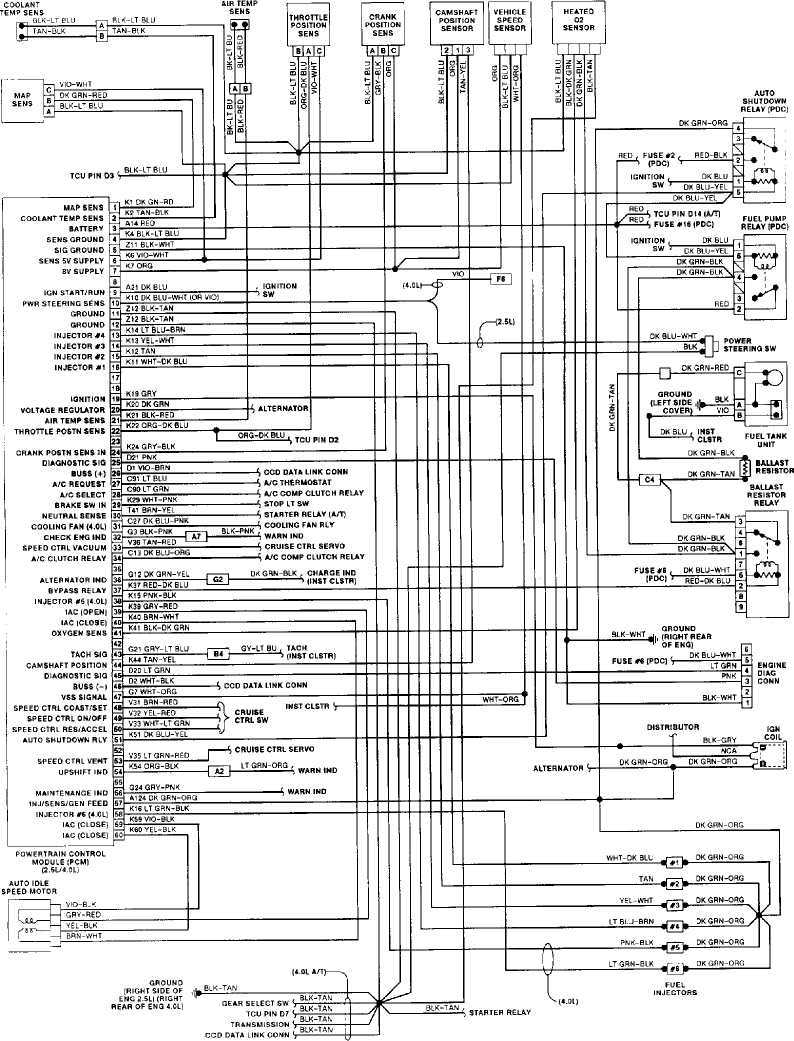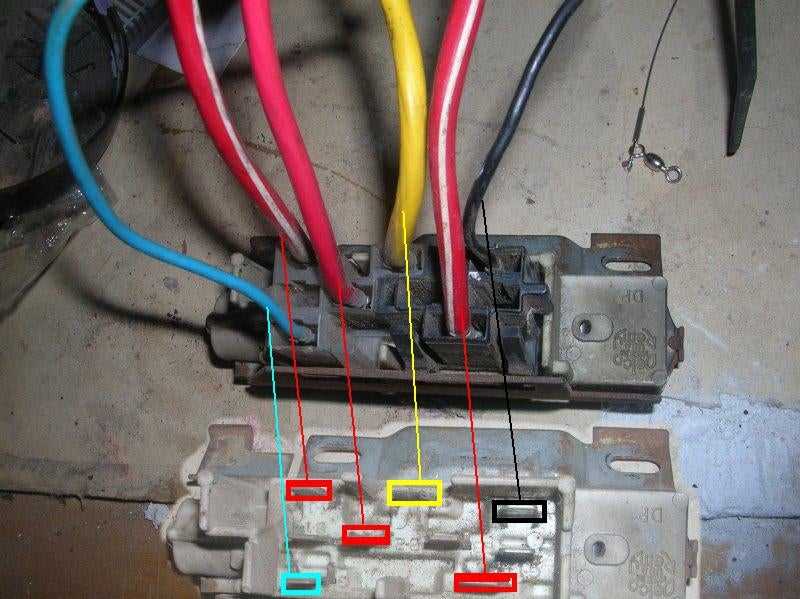
Jeep vehicles have long been known for their off-road capabilities and rugged reliability. However, even the most dependable vehicles can experience electrical issues, and Jeeps are no exception. One common problem that Jeep owners may encounter is with the wiring harness.
The wiring harness is responsible for connecting all of the electrical components in the vehicle, such as the headlights, tail lights, and radio. It is essentially the nervous system of the vehicle, transmitting electrical signals to various parts of the car. When the wiring harness is functioning properly, everything runs smoothly. However, when there are problems with the wiring harness, it can cause a range of issues.
One common symptom of a wiring harness problem is electrical shorts or malfunctions. This can lead to intermittent or complete loss of power to certain components, causing them to stop working or operate erratically. Another issue that can arise from a faulty wiring harness is a failure of the vehicle’s lights, which can greatly affect visibility and safety on the road.
Common Issues with Jeep Wiring Harness
Jeep wiring harness problems can be a frustrating and costly issue for Jeep owners. A wiring harness is a collection of wires and connectors that distribute electrical power and signals throughout the vehicle. When this harness experiences issues, it can lead to various electrical problems that can affect the performance and functionality of the Jeep.
1. Corrosion: Corrosion is one of the most common issues with Jeep wiring harnesses. Over time, the metal connectors and wires can be exposed to moisture, salt, and other elements, leading to corrosion. This can result in poor contact and conductivity, causing electrical failures in various systems of the Jeep.
2. Frayed or Damaged Wires: Another common problem is frayed or damaged wires in the wiring harness. This can occur due to wear and tear, rodents chewing on the wires, or improper installation. A frayed or damaged wire can cause short circuits, open circuits, or intermittent electrical issues in the Jeep.
3. Faulty Connectors: Faulty connectors in the wiring harness can also cause problems. These connectors may become loose, worn out, or damaged over time, leading to poor connections or complete disconnections. This can result in various electrical malfunctions or even complete failure of certain systems in the Jeep.
4. Overheating: Overheating of the wiring harness can occur due to excessive electrical load, faulty components, or inadequate insulation. When the wiring harness overheats, it can cause melted wires, burned connectors, and even electrical fires. Overheating can be dangerous and should be addressed immediately.
5. Wiring Harness Compatibility Issues: Lastly, compatibility issues between the wiring harness and aftermarket components or accessories can also cause problems. If the aftermarket component is not properly wired or does not match the electrical specifications of the Jeep, it can lead to electrical failures or damage to the wiring harness.
It is important for Jeep owners to regularly inspect their wiring harness for any signs of damage or issues. If any problems are detected, it is recommended to seek professional assistance or replace the wiring harness to prevent further electrical problems in the Jeep.
Overview of Jeep Wiring Harness Problems
Jeep vehicles are known for their ruggedness and off-road capabilities, but they are not immune to wiring harness problems. The wiring harness is a network of wires and connectors that carry electrical signals and power to various components of the vehicle. Unfortunately, Jeeps have been plagued with wiring harness issues that can cause a range of problems, from minor annoyances to major electrical failures.
One common problem with Jeep wiring harnesses is frayed or damaged wires. This can happen due to normal wear and tear, or as a result of rodents chewing on the wires. When the wires become damaged, they can cause issues with the electrical systems of the vehicle, such as malfunctioning lights, power windows not working, or even engine failure. It is important to regularly inspect the wiring harness and address any damage or fraying as soon as possible to prevent further issues.
Another common issue with Jeep wiring harnesses is corrosion. Corrosion can occur when moisture and salt get into the connectors and wires, causing them to degrade over time. This can result in poor electrical connections and intermittent electrical problems. To prevent corrosion, it is important to keep the wiring harness clean and dry, and to regularly inspect the connectors for any signs of rust or corrosion. If corrosion is found, it is important to clean and treat the affected area to prevent further damage.
Overall, Jeep wiring harness problems can be frustrating and potentially dangerous. It is important to be vigilant and address any issues with the wiring harness as soon as they arise to prevent further damage and ensure the safe operation of the vehicle.
Signs and Symptoms of a Faulty Jeep Wiring Harness

A wiring harness is an essential component of a Jeep’s electrical system, connecting various parts and components together. Over time, the wiring harness can develop problems, leading to a range of issues and malfunctions. It is important to be aware of the signs and symptoms of a faulty wiring harness in order to address the problem before it causes more significant issues.
1. Electrical malfunctions: One of the most common signs of a faulty wiring harness is electrical malfunctions. This can include problems with the headlights, taillights, dashboard lights, power windows, or even the engine’s ignition system. If you notice any flickering lights, dimming, or issues with electrical components not functioning properly, it may be a result of a damaged wiring harness.
2. Intermittent issues: Another sign of a faulty wiring harness is intermittent issues. This means that the problem may come and go, making it difficult to pinpoint the exact cause. You may experience random electrical failures or inconsistent performance of different systems in your Jeep. These intermittent issues can be frustrating and may require professional inspection to identify the underlying wiring harness problem.
3. Burnt or melted insulation: Inspect the wiring harness for any signs of burnt or melted insulation. Overheating or excessive heat exposure can cause the insulation to melt or become discolored. This can indicate a wiring harness problem, potentially caused by short circuits, loose connections, or excessive current flow. If you notice any burnt or melted insulation, it is crucial to address the problem promptly to prevent further damage and potential safety hazards.
4. Strange smells: A faulty wiring harness can sometimes emit strange smells, such as a burning odor. This can indicate overheating or electrical problems within the harness. If you notice any unusual smells coming from your Jeep’s interior or engine compartment, it is important to have the wiring harness inspected by a professional to determine the cause and address any potential safety concerns.
5. Engine performance issues: In some cases, a faulty wiring harness can also affect the performance of the engine. You may experience engine misfires, stalling, or difficulty starting the vehicle. These issues can be caused by electrical problems within the wiring harness, such as faulty sensors or disrupted communication between the engine and other components. If you notice any unusual engine performance issues, it is worth considering the wiring harness as a possible culprit.
Overall, it is crucial to pay attention to any signs or symptoms of a faulty Jeep wiring harness. Ignoring these warning signs can lead to further electrical problems or even pose a safety risk. If you suspect that your wiring harness may be damaged, it is recommended to have it inspected and repaired by a professional Jeep mechanic who is knowledgeable about wiring harness issues.
Causes of Jeep Wiring Harness Problems
Jeep wiring harness problems can arise due to a variety of factors. The wiring harness in a Jeep is responsible for connecting various electrical components, such as the headlights, tail lights, ignition system, and more. When the wiring harness becomes damaged or faulty, it can result in a range of issues, including malfunctioning lights, difficulty starting the vehicle, or even a complete electrical failure.
One common cause of Jeep wiring harness problems is wear and tear. Over time, the wires in the harness can become frayed or corroded, leading to a loss of conductivity. This can be caused by exposure to moisture, extreme temperatures, or simply the natural aging process. In addition, the constant vibrations and movements of the vehicle can put stress on the wiring harness, causing it to become loose or disconnected.
Another cause of wiring harness problems in Jeeps is improper installation or repairs. If the harness is not installed correctly, or if it is repaired using incorrect wiring or connectors, it can lead to issues like short circuits or faulty connections. It is important to ensure that any installation or repair work is done by a qualified technician who understands the specific wiring requirements of the vehicle.
Additionally, Jeep wiring harness problems can also be caused by manufacturing defects or design flaws. In some cases, the wiring harness may not be properly insulated or protected, leaving it vulnerable to damage. This can be particularly problematic in off-road or rugged conditions, where the vehicle is exposed to dirt, debris, and rough terrain.
To prevent or address Jeep wiring harness problems, regular inspections and maintenance are crucial. This includes checking for any visible signs of damage, such as frayed or exposed wires, as well as testing the electrical components for proper functionality. If any issues are detected, it is important to address them promptly to avoid further damage and ensure the safety and reliability of the vehicle.
Troubleshooting Jeep Wiring Harness Issues

The wiring harness in your Jeep is an important component that connects various electrical systems and components together. However, over time, the wiring harness can develop issues that may cause problems with the operation of your Jeep. If you are experiencing electrical problems or malfunctions in your Jeep, it is important to troubleshoot and address any potential wiring harness issues.
Identify the Symptoms: The first step in troubleshooting wiring harness issues is to identify the symptoms. Some common signs of wiring harness problems in Jeeps include malfunctioning lights, flickering dashboard lights, intermittent electrical failures, and blown fuses. It is crucial to carefully observe and document any unusual behavior exhibited by the electrical systems in your Jeep.
Inspect the Wiring Harness: Once you have identified the symptoms, the next step is to inspect the wiring harness for any visible signs of damage or wear. Start by checking the connections and terminals for signs of corrosion or loose connections. Additionally, look for any frayed or damaged wires, melted insulation, or burnt connectors. It is essential to thoroughly inspect the entire wiring harness to pinpoint the source of the problem.
Use a Multi-meter: If you cannot identify any visible signs of damage, you may need to use a multi-meter to test the continuity and voltage in different sections of the wiring harness. A multi-meter can help you determine if there are any breaks or short circuits in the wiring. Remember to disconnect the battery before using a multi-meter to avoid any electrical shock or damage.
Repair or Replace: Once you have identified the specific issue with your wiring harness, you can repair or replace the affected sections. In some cases, simple repairs such as re-soldering loose connections or replacing damaged connectors may solve the problem. However, if the wiring harness is extensively damaged or the issue is not easily repairable, it may be necessary to replace the entire wiring harness.
Professional Assistance: If you are not confident in your ability to troubleshoot and repair wiring harness issues, it is recommended to seek professional assistance. A qualified mechanic or electrician with experience in working on Jeeps will have the necessary expertise and equipment to diagnose and fix any wiring harness problems effectively. They can ensure that the repairs are done correctly and safely.
In conclusion, troubleshooting Jeep wiring harness issues requires careful observation, inspection, and testing. It is essential to identify the symptoms, inspect the wiring harness for damage, use a multi-meter to test continuity and voltage, and then repair or replace the affected sections. If you are unsure, it is always best to seek the help of a professional. By addressing wiring harness problems promptly, you can ensure the proper functioning of your Jeep’s electrical systems.
Repair and Replacement Options for Jeep Wiring Harness
Jeep wiring harness problems can be a frustrating and potentially dangerous issue for owners. A faulty wiring harness can cause various electrical issues in a Jeep, such as malfunctioning lights, stereo problems, and even engine performance issues. Fortunately, there are repair and replacement options available for Jeep owners facing wiring harness problems.
One option for addressing wiring harness problems is to repair the existing harness. This can involve identifying the specific area of damage or malfunction and replacing or repairing the affected wires or connectors. Depending on the extent of the damage, this can be a challenging task and may require the help of a professional mechanic or an experienced DIY enthusiast. Additionally, finding the specific parts needed for the repair can sometimes be difficult, especially for older Jeep models.
Another option for addressing wiring harness problems is to replace the entire harness. This can be a more straightforward solution, especially if the existing harness is severely damaged or outdated. Jeep owners can purchase a complete wiring harness kit specifically designed for their vehicle model. These kits often come with all the necessary wires, connectors, and mounting hardware, making the installation process easier. However, replacing the entire harness can be more time-consuming and may require advanced knowledge of electrical systems.
In some cases, it may be more cost-effective to have a professional mechanic or an automotive electrical specialist diagnose and repair the wiring harness problem. These professionals have the expertise and tools needed to accurately identify the issue and provide the most appropriate solution. They can also ensure that the repaired or replaced wiring harness meets the necessary safety and performance standards.
To prevent future wiring harness problems, it is essential to regularly inspect the harness for any signs of wear, damage, or corrosion. Keeping the harness clean and protected from moisture and debris can also help prolong its lifespan. Additionally, avoiding modifications or aftermarket installations that may put additional strain on the wiring system can help prevent potential issues.
- In summary, Jeep owners facing wiring harness problems have several options for repair and replacement. Repairs can be done by identifying and fixing specific areas of damage, but can be challenging and may require professional assistance. Replacing the entire harness can be a more straightforward solution, but may require advanced knowledge and more time. Professional mechanics or electrical specialists can provide expertise and ensure proper repair or replacement. Regular inspection and maintenance can help prevent future wiring harness problems.
Preventing Future Jeep Wiring Harness Problems

Jeep wiring harness problems can be frustrating and costly, but there are steps you can take to prevent them in the future. Here are some tips to help ensure your Jeep’s wiring harness stays in good condition:
- Regular inspections: It’s important to regularly inspect your Jeep’s wiring harness for any signs of damage, such as frayed wires or loose connections. This can help you catch any potential issues early on before they escalate.
- Proper installation: When installing any new components or accessories that require wiring, make sure to follow the manufacturer’s instructions carefully. Improper installation can put unnecessary strain on the wiring harness and lead to problems down the line.
- Avoid overcrowding: Overcrowding of wires can increase the risk of damage and short circuits. Make sure to organize and secure your Jeep’s wiring harness properly to prevent any unnecessary strain or interference between wires.
- Protect from environmental hazards: The wiring harness of a Jeep is exposed to various environmental hazards, such as water, dirt, and extreme temperatures. Taking measures to protect the harness, such as using wire loom or routing the wires away from potential hazards, can help prolong its lifespan.
- Use quality components: When replacing any wiring components, make sure to use high-quality parts that are specifically designed for your Jeep model. This can help ensure compatibility and reduce the chances of future wiring harness problems.
By following these preventive measures and staying vigilant with maintenance, you can minimize the risk of future wiring harness problems in your Jeep. It’s important to prioritize the health of your wiring harness to avoid any inconvenience or costly repairs. Regular inspections, proper installation, and protecting the harness from environmental hazards are all crucial steps in maintaining a reliable and functional wiring system.